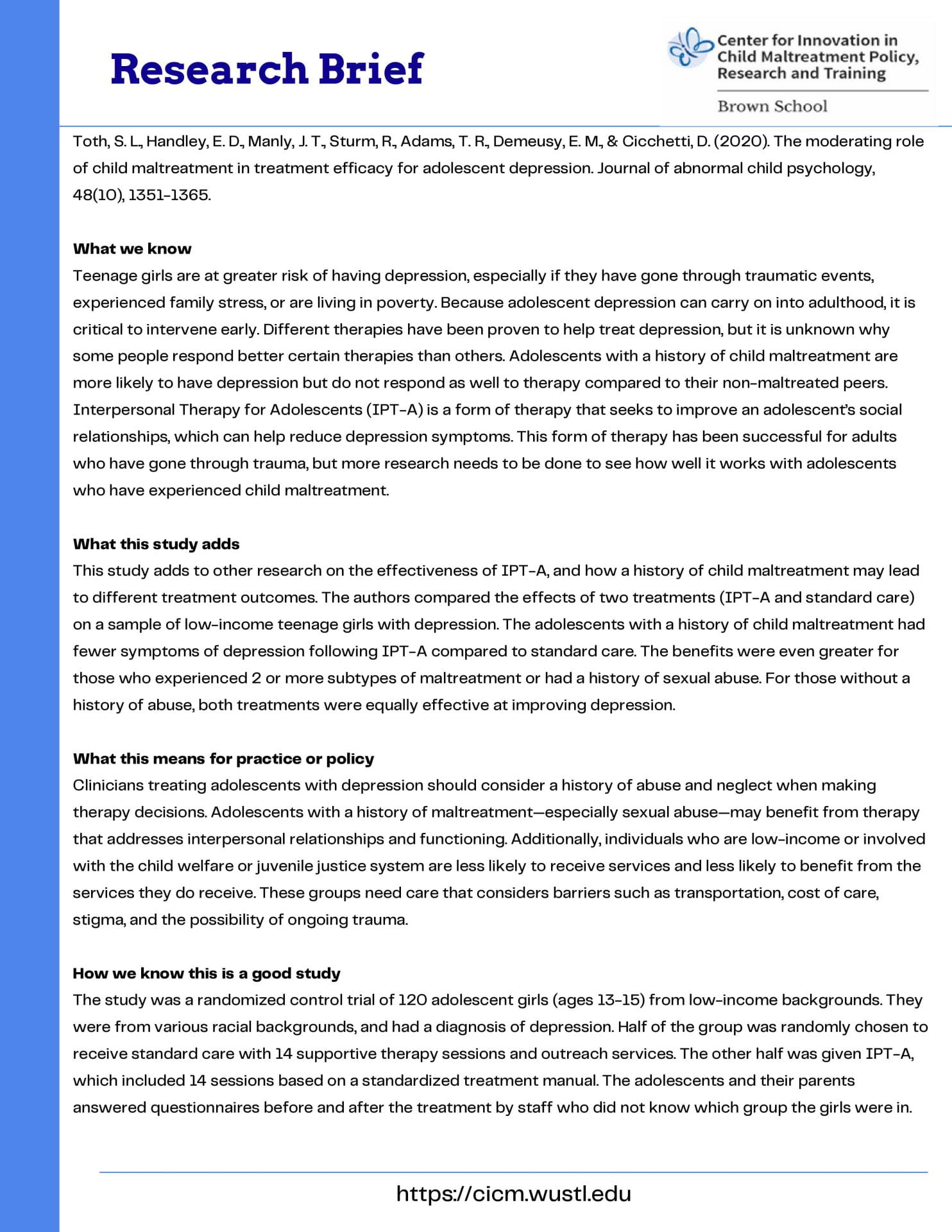The Moderating Role of Child Maltreatment in Treatment Efficacy for Adolescent Depression
Research Brief

Toth, S. L., Handley, E. D., Manly, J. T., Sturm, R., Adams, T. R., Demeusy, E. M., & Cicchetti, D. (2020). The moderating role of child maltreatment in treatment efficacy for adolescent depression. Journal of abnormal child psychology, 48(10), 1351-1365.
What we know
Teenage girls are at greater risk of having depression, especially if they have gone through traumatic events, experiencing family stress, or are living in poverty. Because adolescent depression can carry on into adulthood, it is critical to intervene early. Different therapies have been proven to help treat depression, but it is unknown why some people respond better certain therapies than others. Adolescents with a history of child maltreatment are more likely to have depression but do not respond as well to therapy compared to their non-maltreated peers. Interpersonal Therapy for Adolescents (IPT-A) is a form of therapy that seeks to improve an adolescent’s social relationships, which can help reduce depression symptoms. This form of therapy has been successful for adults who have gone through trauma, but more research needs to be done to see how well it works with adolescents who have experienced child maltreatment.
What this study adds
This study adds to other research on the effectiveness of IPT-A, and how a history of child maltreatment may lead to different treatment outcomes. The authors compared the effects of two treatments (IPT-A and standard care) on a sample of low-income teenage girls with depression. The adolescents with a history of child maltreatment had fewer symptoms of depression following IPT-A compared to standard care. The benefits were even greater for those who experienced 2 or more subtypes of maltreatment or had a history of sexual abuse. For those without a history of abuse, both treatments were equally effective at improving depression.
What this means for practice or policy
Clinicians treating adolescents with depression should consider a history of abuse and neglect when making therapy decisions. Adolescents with a history of maltreatment—especially sexual abuse—may benefit from therapy that addresses interpersonal relationships and functioning. Additionally, individuals who are low-income or involved with the child welfare or juvenile justice system are less likely to receive services and less likely to benefit from the services they do receive. These groups need care that considers barriers such as transportation, cost of care, stigma, and the possibility of ongoing trauma.
How we know this is a good study
The study was a randomized control trial of 120 adolescent girls from low-income backgrounds. They ranged in age from 13-15, were from various racial backgrounds, and had a diagnosis of depression. Half of the group was randomly chosen to receive standard care with 14 supportive therapy sessions and outreach services. The other half was given IPT-A, which included 14 sessions based on a standardized treatment manual. The adolescents and their parents answered questionnaires before and after the treatment by staff who did not know which group the girls were in. The authors used statistical analysis to see how treatment outcomes varied based on history of maltreatment. There were important limitations to consider. More youth dropped out of this study (25 in the IPT-A group and 18 in the standard care group) compared to other studies. This is likely because the girls were not actively seeking treatment, had higher rates of poverty, and lower access to transportation. Girls who dropped out were more likely to be Black or have anxiety in addition to depression. While the rate of compliance was not as high as in other studies, the inclusion of this population is still important to include in research.